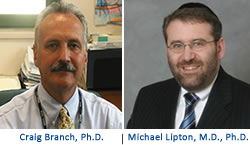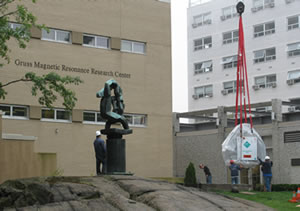FULL STORY
Einstein Announces Major Expansion of MRI Research Facility
June 18, 2009 — (BRONX, NY) — The capability and scope of magnetic resonance imaging (MRI) studies at Albert Einstein College of Medicine of Yeshiva University are being significantly expanded with the appointment of two nationally recognized leaders in the field. Craig Branch, Ph.D., has been named director, and Michael Lipton, M.D., Ph.D., has been named associate director of Einstein's Gruss Magnetic Resonance Research Center (MRRC). Both are faculty in the department of radiology, which will manage the center under the guidance of its chair, Dr. Stephen Amis. The announcements were made by Allen M. Spiegel, M.D., The Marilyn and Stanley M. Katz Dean at Einstein.
 The MRRC, a 19,000-square-foot facility located on the main Einstein campus, was established in 2000 with a generous gift to Einstein from the Gruss Lipper Foundation. Its cutting-edge technology will provide Einstein researchers with the most advanced noninvasive means currently available to investigate disorders and diseases attacking the anatomy and physiology of living organisms.
The MRRC, a 19,000-square-foot facility located on the main Einstein campus, was established in 2000 with a generous gift to Einstein from the Gruss Lipper Foundation. Its cutting-edge technology will provide Einstein researchers with the most advanced noninvasive means currently available to investigate disorders and diseases attacking the anatomy and physiology of living organisms.
"Under Craig and Michael's leadership, the MRRC will support MRI research in numerous health-related areas, including neuropsychiatric disorders, cancer, and cardiac and metabolic disorders," said Dr. Spiegel. "The Center will also support studies of cognition and development and the creation of new imaging technologies while offering expanded learning opportunities for Einstein students, as well as clinical and basic science investigators."
"We are very excited about the many possibilities for broader research collaborations and education that the Center can offer," said Dr. Branch. "Our aim is to invigorate magnetic resonance imaging and spectroscopy applications research within the Einstein community. Toward that aim, we're installing the most advanced equipment available for clinical, basic, and translational research, which will provide for a strong educational program. We've also begun initiatives to expand existing research programs in areas that include cancer, diabetes, brain trauma, obesity, psychiatry, and hematology. Stimulating research collaborations between the clinical and basic science departments by providing translational imaging methodology is a primary mission of the Center."
"I am delighted that Drs. Branch and Lipton have been recruited to oversee the programs at the Gruss Center. Their extraordinary breadth of knowledge and dynamic vision for the future will greatly enhance the Center's impact, both on biomedical research and on the education of Einstein students," said Evelyn Gruss Lipper, M.D., a trustee of the Gruss Lipper Foundation and a member of the Einstein Board of Overseers. A 1971 graduate of Einstein and a former faculty member of the College of Medicine, Dr. Lipper has served on its Board of Overseers since 2004. (In 2006, a second major gift from the Gruss Lipper Foundation established the Biophotonics Center at Einstein.)

A 3.0 Tesla MRI and spectroscopy system is hoisted
for installation at Einstein's Gruss MRRC."Education will be an important component of our overall program," noted Dr. Lipton. "In addition to Educational Outreach Programs for Einstein students and for clinical and basic science investigators, we plan to establish an invited lecture series focused on MRI research methods."
Renovations to the MRRC will include installation of a state-of-the-art 3.0 Tesla magnetic resonance imaging and spectroscopy system from Philips Medical Systems along with a complete overhaul of the existing 9.4 T imaging and spectroscopy system. "These renovations, coupled with new computing infrastructure will aid translational research efforts by providing access to the latest advances in MR technology and image analysis software," noted Dr. Branch. The renovations will allow an exciting range of imaging studies to be conducted, from cellular studies to full body scans.
"By adding a clinical component to our imaging capabilities, we can bridge research with clinical applications located on the Einstein campus and within Montefiore Medical Center," added Dr. Lipton. "For example, the human scanner we'll be installing is based on the same platform as nearly all of the MRI equipment throughout the entire Montefiore system. This provides a unique advantage to the MRRC in that new methods developed at the Center can be readily translated to the clinic for use in clinical studies and patient care." Montefiore Medical Center is the University Hospital and Academic Medical Center for Einstein.
In addition to making these critical renovations, designed to broaden the Center's capabilities, Drs. Branch and Lipton are hiring new staff to optimize services. These include Dr. Xiaobo Li, an image analysis expert; Dr. Jeremy Smith, manager of computing systems; Dr. Min-Hui Cui, 9.4 T and Magnetic Resonance Spectroscopy support; and Mr. Richard Alaimo, administration. Additionally, Dr. Linda Jelicks has joined the MRRC core support team and will continue assisting high field-imaging and spectroscopy at the Center. There are plans to add two MRI technicians and another imaging physicist to the team.
Drs. Branch and Lipton have worked together previously through the collaborative relationship between Einstein and the Center for Advanced Brain Imaging (CABI) at the Nathan S. Kline Institute for Psychiatric Research, where Dr. Branch had served in numerous capacities since 1995 − most recently as senior research scientist, director of CABI and Basic Neuroimaging, and chief of the division of medical physics. Both researchers are longstanding members of the Einstein faculty; Dr. Branch as associate professor of radiology and of neuroscience since 1997, and Dr. Lipton as assistant professor of radiology since 1997. Since 2007, Dr. Lipton has served as associate professor of both radiology and psychiatry and behavioral sciences.
In addition to his previous roles at the Nathan Kline Institute, Dr. Branch is a member of the board of directors for Advanced Veterinary Technologies, Inc., a company which he co-founded and where he had served as chief operating officer and vice president of product development from 2000 to 2007. He received his bachelor's, master's and doctoral degrees from Oakland University, in Rochester, Michigan. Prior to Nathan Kline Institute, he performed research in the neurology department at Henry Ford Hospital and was on the biomedical engineering faculty at the University of North Carolina at Chapel Hill. His research has centered on the development of MRI-based measures of brain function and their application to brain disorders.
A board-certified neuroradiologist, Dr. Lipton is the founding director of the Division of Radiology Research at Montefiore Medical Center, where he maintains the Translational Neuroimaging Laboratory. He has served in this role since 1999. He also is the medical director for MRI Services at Montefiore. He came to Einstein in 1991, completing a residency in diagnostic radiology, followed by a clinical fellowship in neuroradiology. In 1997, he became an attending radiologist at Montefiore. He received his bachelor's and medical degrees from Boston University, after which he completed an internship in internal medicine at Brookdale Hospital Medical Center. He earned his master's and doctoral degrees, in neuroscience, at Einstein. His research in neuroimaging has redefined our understanding of somatosensory cortical organization and revealed the effects of mild traumatic brain injury on cognition.
Other Top Stories
9/11 World Trade Center Exposure Linked to Heart Disease Among NYC Firefighters
On Becoming a Physician: New Einstein Students Receive White Coats and Stethoscopes
Novel Therapy for Acute Migraine Shows Promise in Phase 3 Clinical Trial
First Complete Wiring Diagram of an Animal's Nervous System
Multimillion Dollar NIH Grant to Help Reduce Opioid Use & Get Care to People Who Need It
NIH Grant Funds $23 Million Study of Diseases Affecting People Living with HIV
New TAILORx Data Guides Adjuvant Therapy in Younger Breast Cancer Patients
Einstein Celebrates Its 61st Commencement
Bolstering Biopsies: Testing Patients' Individual Cells to Guide Treatment



Tablet Blog